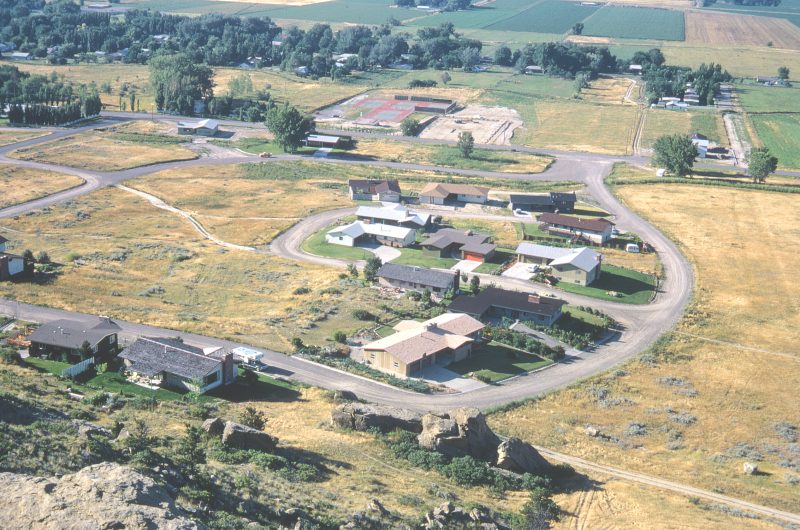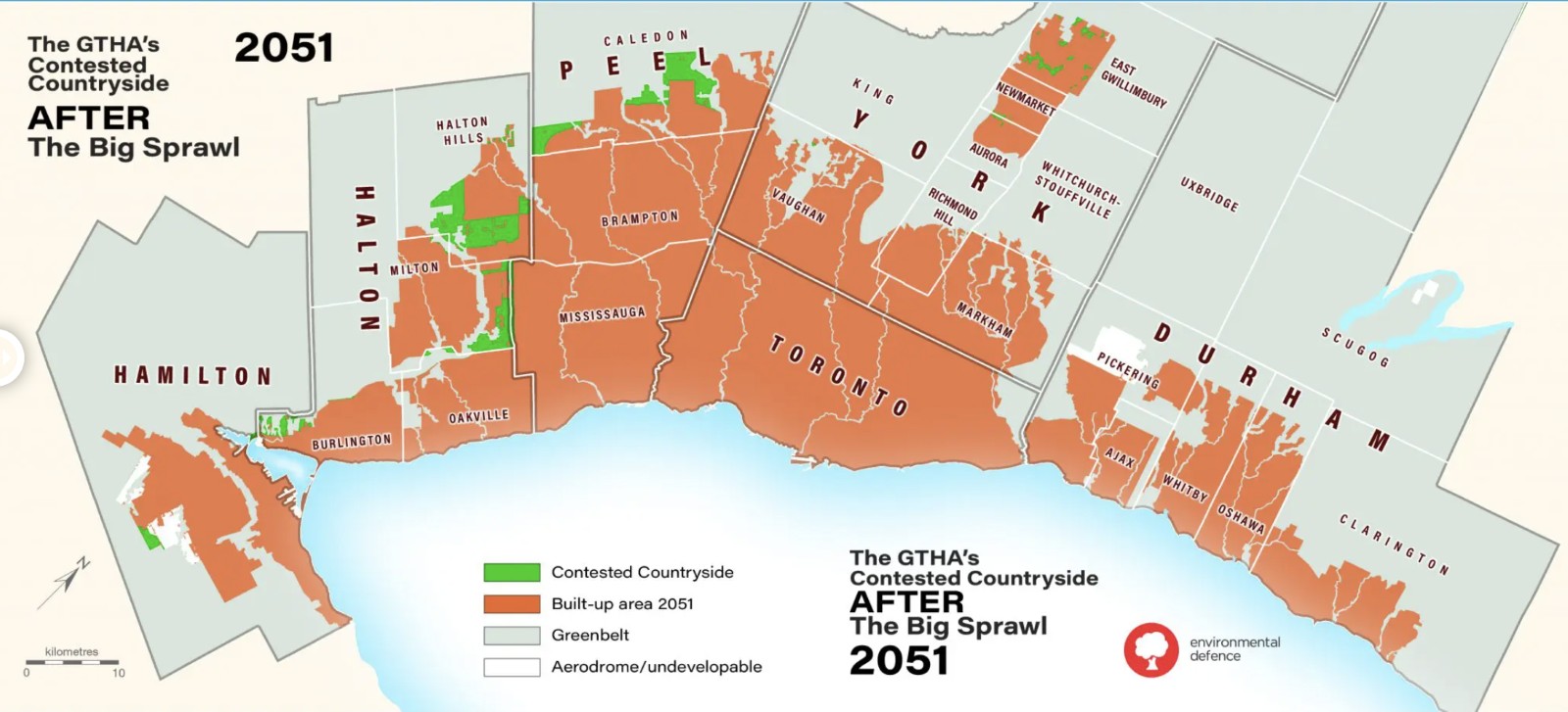Stop the sprawl


Young Ontarians are consistently voting less and experiencing more doubt in politics. Many exhibit a more nihilistic approach regarding the magnitude of their impact, assuming they’re just one person, and how much of a difference could one person make? This, in retrospect, reiterates a self-fulfilling prophecy in which nothing will ultimately be accomplished.
I caught up with Kevin Thomason, Laurier Alumni and Vice Chair of Grand River Environmental Network, at the #StoptheSprawl rally in Waterloo Park where citizens gathered to defend the greenbelt.
Thomason expressed profound disappointment regarding the Ford government’s decision to extend municipal boundaries and allow urban sprawl into farmland, stating “Rural severances going through [after the August fourth election] would be absolutely, utterly devastating and transform this province in ways that people can’t even conceive.” This move to build into the greenbelt prioritizes developers over community needs, despite experts confirming existing land can accommodate housing demands, up to two million semidetached homes.
Thomason emphasizes the importance of building sustainable, walkable communities to reduce car dependence and preserve green spaces and the importance of building up, not out to promote higher density in areas with affordably developed homes that respect existing boundaries.
“It’s very troubling to see how short-sighted things are because the future generations are going to need farmland and food more than ever with climate change and the climate crisis.” He further commented on the consequences to the agricultural sector: “The provincial government is working to undermine the farmers, encouraging them to sell the farms, short-changing future generations and food production”. He added, “I think they are ignoring data; they’re ignoring science; they’re really partnered heavily with home builders’ associations. We are in a housing crisis that is true but they’re looking to solutions only from the private sector and from folks who can make money from towers and make money from subdivisions but attainable housing affordable housing rentals and supportive housing the area where the government needs to show leadership.”
He expressed disappointment over seeing all the municipal councils approve [the plan] and the regional council approve it near unanimously “with no data, no information, no rationale and of course thousands of acres of urban sprawl of farmland that’s completely unnecessary”. It’s clear, it only makes sense, that the priorities lie within the lining of developer’s pockets.
Marit Stiles, The NDP leader and leader of Ontario’s official opposition pointed out the urgency of protecting farmland for food security and the importance of responsible urban development. Stiles criticizes the lack of political will to address housing affordability, transit, and other essential issues, suggesting a need for government intervention. She emphasized the government’s fixation on urban sprawl and its implications for housing, environmental, and economic concerns that benefitted parties close to Ford’s personal pockets.
Adding the decline in affordable housing options due to lack of government intervention and the need for responsible development.
Stiles calls for increased funding and actions to address transit infrastructure and environmental issues. “It isn’t a question of whether you know it can be done, it’s just a question of political will. A government with the political will to do that can protect farmland, can make sure that farmers can continue to pass on that family farm to their families”. A government’s will is as strong as their citizen’s vote. The housing we need, even the hypothetical development proposals, can absolutely be built within existing boundaries. This is about Ford ensuring that some developers who are donors to his party make a lot of money from these landings and can develop expensive country homes on them.
Stiles further announced that Ontario is losing 319 acres a day of farmland and stressed the consequences on communities, the economy, and most importantly what it means for food security. Ontario feeds Canada. The government has demonstrated repeatedly that it’s going to prioritize putting Doug Ford’s friends, developer friends, ahead of the needs of local communities and farmers.


Waterloo Region ACORN Representative Mikha Codi discussed both affordability and accessibility challenges faced by low-income, marginalized, and disabled and elder individuals due to car-centric planning made worse by urban neighbourhood sprawl. He highlighted renters’ concerns about rising rents and lack of affordable options, along with the need for better rent control policies. “Housing needs to be affordable and sprawling into the greenbelt will not be affordable or accessible for low-income people. A lot of them don’t have cars so they won’t be able to get to urban centres… so we need that to be able to connect them to places of work… to resources and connect them to communities… Old people, it’s too far away from hospitals and if you really cared about affordable housing, he [Ford] wouldn’t be building it on his buddy’s land and land developers that seem to have bought it almost conspicuously”. We grow old, we struggle with disabilities, and so we need to stand up for everyone equally because we will become the eldest generation eventually. Our family, friends and community are aging and will struggle with these consequences.
I also had the chance to meet Aislinn Clancy; former WLU grad, city counsellor in Kitchener for Word 10, social worker, climate advocate, mom and candidate for the Green Party in Kitchener Center for the upcoming by-law action.
She remained hopeful while emphasizing the negative consequences of prioritizing developer interests over community and environmental needs: “It’s up to us as residents to push back against all the money, the billions that are going into highways. Federal, municipal and regional governments need funding. Cities can’t run a deficit. We can’t spend money on things that we can’t offset. that’s why you see fare increases and route roots being cut. We don’t have the levels of government pitching in, if anything, the provincial government is making cuts to cities in regions and our ability to pay for these things so they’re all kind of passing the buck. They’re sitting on tons of money waiting for a rainy day saying that they promise these things and then they don’t follow through. That’s depressing.”
Additionally, Clancy mentioned an article by The Record in which a Kitchener landlord doubled rent for Syrian refugees from $1,900 per month to $4,000 per month. She had this to say; “being renovicted, it’s traumatic. I think when you give the power to people investors like numbered companies who own people’s homes, it’s ridiculous.”
Clancy brought up a great point regarding the commodification of housing; “If I buy a Google stock and the stock goes down that’s the risk I’ve taken. You shouldn’t be protected from the risk of your investment when you’re dealing with people’s houses”. She echoed the sentiments of her fellow activists calling the speculative endeavor the “Wild West business”. Adding, “there’s no long-term vision for how we plan to make sure we have these basic needs met and this government is in their bubble. if you look at a lot of the MPPs and stakeholders they’re in their postal codes where they are an echo chamber to each other on how they’re gonna get rich quick there’s such a disconnect from the reality people are facing”
Clancy concluded, saying; “we’re rarely reactive versus proactive… that’s why we need young people to vote”. I couldn’t agree more.
We often act as though our actions can’t affect the bigger picture, but that is often a coping mechanism. We must work against our complacency, as the final snowflake will never take the blame for starting the avalanche.
It is our strength in numbers that will secure our future, one in which we will look back and feel grateful for the steps we took to actively set aside our limiting beliefs and realize that together, our individual agency creates a unanimous vote for the future we want to live in; where it’s not profit over people.


